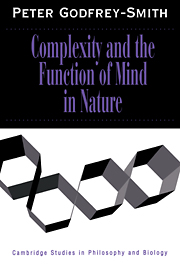7 - Adaptive plasticity
Published online by Cambridge University Press: 05 June 2012
Summary
The question
An organism confronts an environment which has a range of alternative possible states. The organism itself has a range of possible states, a range of possible behavioral or developmental choices. The alternative environmental states have consequences for the organism's chances of surviving and reproducing, and the right organic choice for one environmental state is not the right choice for another. The organism receives imperfect information about the actual state of the environment, as a consequence of correlations between environmental conditions which matter to it and environmental conditions which directly affect the periphery of its body. Under what conditions is it best for the organism to make use of this information, and adopt a flexible behavioral or developmental strategy, choosing its state in accordance with what it perceives, and under what conditions is it best for the organism to ignore the information, and always choose the same option, come what may?
This chapter and the next will discuss this problem with the aid of some simple mathematical tools. The aim of the present chapter is to describe abstractly some of the circumstances in which it is best to be a smart, flexible organism and some circumstances under which it is best to be unresponsive and rigid. This should tell us something about the value of cognition, as cognition is conceived here as a device making possible extensive flexibility and adaptibility to local conditions.
- Type
- Chapter
- Information
- Complexity and the Function of Mind in Nature , pp. 207 - 231Publisher: Cambridge University PressPrint publication year: 1996

